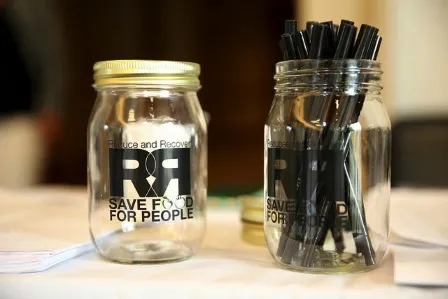
We’re taking our mission to scale back restaurant meals waste on the highway – and seeing a number of inventive considering on the market, in eating places and past.
The newest cease for the Nationwide Restaurant Affiliation was Harvard College, the place we joined lots of of different leaders within the food-waste-reduction motion for a “Reduce and Recover: Save Food for People” workshop.
The NRA’s Laura Abshire, sustainability director, moderated a session on meals restoration. 4 suggestions from her panel:
- Design a customized program. Panera Bread donates leftover bread and baked items from greater than 800 company-owned shops on the finish of every night time to native hunger-relief businesses. Panera Bread exec Mindy Gomez-Casseres mentioned the corporate’s “Day-End Dough-Nation” initiative contributes greater than $100 million in unused bread and bakery gadgets every year.
- Companion up. Foodservice firms made a whopping 1.6 million meals donations final 12 months by means of the Food Donation Connection, reported FDC’s Steve Dietz. FDC acts as a intermediary between eating places and grocers and 9,000 native shelters, rescue missions and meals banks. Purchasers say working with FDC makes each side of the food-donation course of simpler, from price to transportation to legal responsibility. A facet profit: It may be nice for crew morale, says Entire Meals Market’s Karen Franczyk. Her firm is working with FDC to donate extra sizzling, ready meals. “Workers didn’t like throwing away meals at closing. They’re comfortable it goes to the hungry.”
- Perceive your legal responsibility. Many eating places worry legal responsibility once they donate ready meals stock. However the federal Bill Emerson Good Samaritan Act protects donors towards donation-related legal responsibility claims. “It’s clear a number of restaurateurs don’t perceive this,” says Abshire. “We wish to get the phrase out: U.S. legislation protects donations made in good religion.”
- Look ahead to misguided mandates. Cities and states are more and more passing payments to ban natural waste from landfills, Abshire famous. However the mandates usually come earlier than the required infrastructure is in place. Banning meals waste gained’t work if jurisdictions don’t have the amenities to assist composting or different alternate options, Abshire mentioned.
The occasion was hosted by Harvard Regulation College’s Food Law and Policy Clinic. The Environmental Safety Company and theMassachusetts Division of Environmental Safety have been companions.
An estimated 40 p.c of meals is wasted in america every year. A federal initiative launched final 12 months goals to cut food waste in half by 2030.
What are you doing to scale back meals waste in your restaurant? Let us know.







